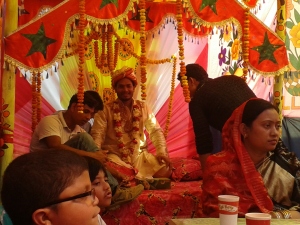It’s time for me to address another of the common questions I have been posed since my conversion: Will you wear a hijab?
My favourite example of being asked this was by a man I had just been introduced to my a friend. It was quite soon after I had converted and she had given my old name, then corrected herself to Nazmeen. The next section of conversation went as follows:
Friend: Sorry, Naz just recently converted to Islam and I am trying to get used to using her new name.
Man: (disgusted look on face) Why?
Me: It felt like the right thing to do.
Man: Are you wearing a hijab?
Me: (touching my own hair) Umm..no, guess not.
Man: Well, maybe in the future it will seem like the right thing to do.
Me: Well, then I will do it. (Turning away from ridiculous,abrasive man)
As I mentioned in my post Second Class Citizen, many non-Muslims see the hijab as a symbol of everything that is wrong with Islam: it hides women, it takes away women’s voices, it oppresses women, it encourages wife-beating. Quite a feat for a piece of cloth.
The real meaning of the hijab, however, is not oppression and sexual inequality. Rather, it is a way for the wearer to show their humility before Allah. It is worn in the same way that many Muslim men choose to wear a taqiyah or topi – a small cap that can be worn either alone or under a keffiyah or scarf. I wonder why people observing men in these don’t worry about how oppressed they are?
In a similar way to the hijab, there is a man’s version of the burqa. It is a plain, loose-fitting shirt and pyjama-style pants, designed to be modest and not accentuate any bits that could lead to impure thoughts. That is, to be pure of thought and deed requires us to not be distracted by the thousands of things that could potentially pull us off course. Boobs being the most distracting thing known to man, we women have to help them in their quest for purity of soul by keeping our funbags under wraps. Women, on the other hand, like to claim that we are not so easily distracted, but I’m basically a bit of a perv and a good-looking guy in a tightish t-shirt can hold my attention for a good seven to nine minutes.
The final point about the hijab is that it serves as a physical reminder of the mental veil we should wear. Only Allah is perfect. Only Allah has the right to boast and to brag about all he has done and created and continues to do. Hubris has no place in a Muslim’s heart, and the hijab and taqiyah remind us that there is someone above us, looking down with love and affection.
Personally, I am not ready to start wearing a hijab. Maybe in the future it will seem appropriate to me, but I’m not there yet. However, I have nothing but the highest respect for my sisters who do so.

